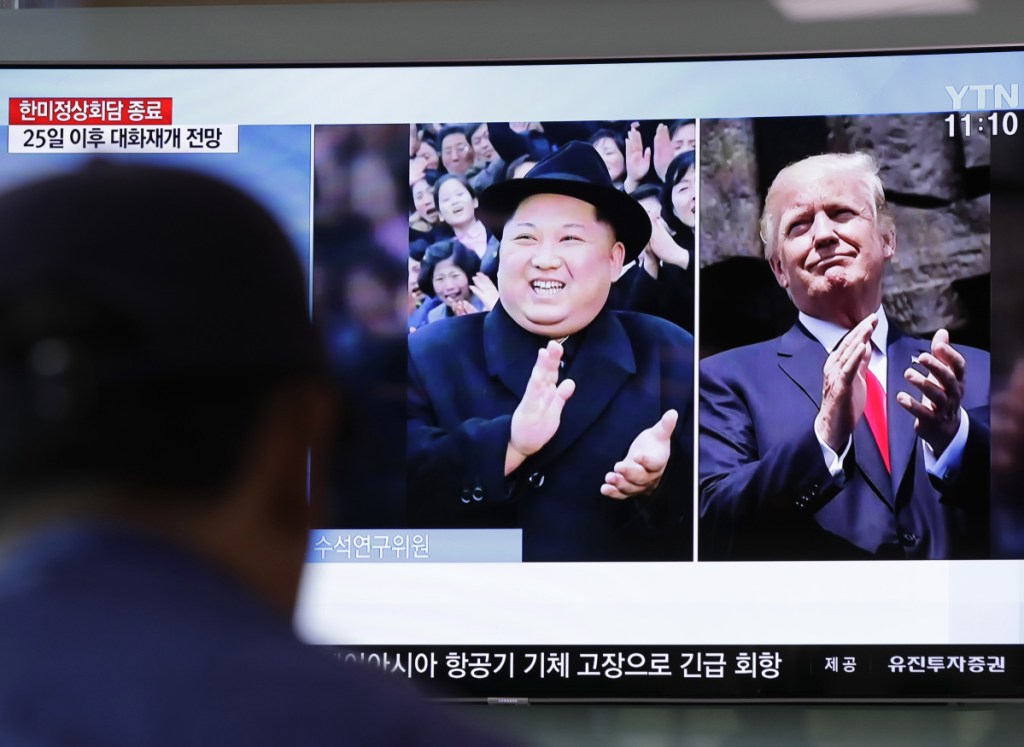At the core of President Trump’s foreign policy is a belief that he can use his personal charisma to charm his way to world peace.
The collapse Thursday of the planned summit with North Korean leader Kim Jong Un shows the limits of Trump’s me-first approach to diplomacy.
Trump’s letter to Kim canceling the meeting on North Korea’s nuclear program neatly summed up his view. In it, the president described the “wonderful dialogue” that he believed had been developing with Kim.
“Ultimately that dialogue is all that matters,” Trump wrote.
But the backtracking, insults and miscommunications of the last week demonstrate that there was far more in play than just the chemistry between two leaders. In the end, what killed the summit was the rushed nature of the negotiations, the lack of message discipline by senior Trump officials and the absence of the meticulous planning that typically leads to diplomatic breakthroughs.
“Trump’s style of negotiation – making the big demand before the ground is fully prepared – is still not disproven,” said Patrick Cronin, an expert on Asia at the Center for a New American Security and frequent adviser to the Pentagon. But Trump may have to scale back his ambitions. “It is not complete denuclearization or bust,” Cronin said.
Trump’s initial overture to Kim, made with little input from his top foreign-policy advisers, was typical of a president who has flouted convention from the moment he took office. Trump stunned aides in March when he accepted an offer made on Kim’s behalf by South Korean emissaries for a summit to discuss denuclearization.
Before the apparent breakthrough, the United States and North Korea seemed to be hurtling toward a military confrontation.
The president warned that any threatening action by North Korea would be met with “fire and fury.” In the run-up to the Winter Olympics in South Korea, Trump asked his staff to present him with plans to evacuate the dependents of U.S. military personnel from the peninsula, according to administration officials.
A presidential official order mandating the move was drafted and approved by the National Security Council’s lawyers before White House Chief of Staff John Kelly and Defense Secretary Jim Mattis talked Trump out of it, according to a former senior administration official familiar with the matter. The former official spoke on the condition of anonymity to discuss internal deliberations.
Kelly and Mattis, both former Marine generals, warned Trump that the plan, if implemented, would alienate South Korea, ruin the Olympics and possibly trigger a hostile response from North Korea.
By early April, however, Trump was talking about a face-to-face summit with Kim, the denuclearization of the peninsula and possibly even a historic peace treaty with the North.
“Nobody thought we could be on this track in terms of speed,” Trump boasted from the tarmac at Joint Base Andrews in May alongside three Americans released by North Korea in a goodwill gesture. The emotional high came just days after Trump had basked in chants of “Nobel” during an appearance at a Michigan rally – a suggestion that he could win the Nobel Peace Prize.
“The early success probably convinced Trump that this was going to be easier than it turned out to be,” said Victor Cha, Trump’s presumptive nominee to be U.S. ambassador to South Korea before he was forced to withdraw. “He believed his own hype.”
Much of the typical planning that accompanies high-level summits was missing. In a more traditional diplomatic process, months of lower-level meetings would precede a presidential summit.
Those kind of talks are designed to build confidence and set the agenda for the principals. That process normally would have led North Korea to disclose all of its nuclear facilities so that Washington would have a clear understanding, long before the talks began, of Pyongyang’s program. Such a list was never offered.
In the case of the negotiations over Iran’s nuclear program, the Obama administration and Tehran talked for more than two years before a deal was signed. Trump pulled out of the agreement earlier this month because he said it did not go far enough in cutting off Iran’s path to a nuclear weapon.
Ultimately the absence of these more quotidian bureaucratic steps doomed the North Korea talks.
What remains to be seen is whether the administration’s modus operandi – with its theatrical bravado, grand gestures and guessing-game optics – can actually deliver a diplomatic win. Trump entered the sprint to historic negotiations without an ambassador in South Korea and with a new secretary of state in Mike Pompeo and a new national security adviser in John Bolton.
Vice President Mike Pence and Bolton provoked a swift and angry backlash from Kim when they suggested regime change was a possibility if the North didn’t denuclearize.
“This is North Korea 101,” said Suzanne DiMaggio, a senior fellow at the New America Foundation. “When you push on them and expose any weakness, they are going to push back. And someone like Trump should understand that.”
Send questions/comments to the editors.



Success. Please wait for the page to reload. If the page does not reload within 5 seconds, please refresh the page.
Enter your email and password to access comments.
Hi, to comment on stories you must . This profile is in addition to your subscription and website login.
Already have a commenting profile? .
Invalid username/password.
Please check your email to confirm and complete your registration.
Only subscribers are eligible to post comments. Please subscribe or login first for digital access. Here’s why.
Use the form below to reset your password. When you've submitted your account email, we will send an email with a reset code.